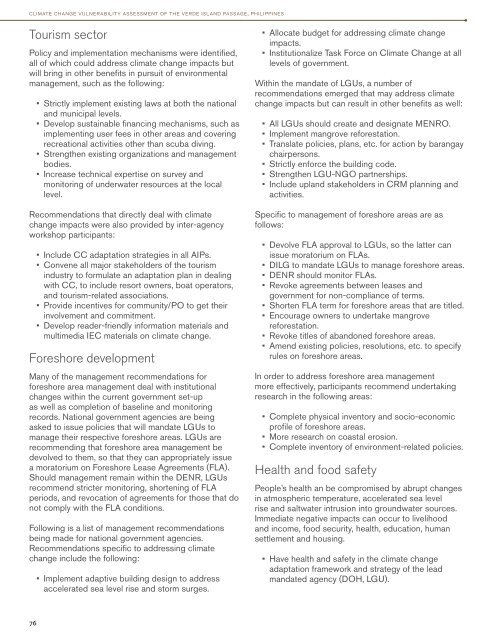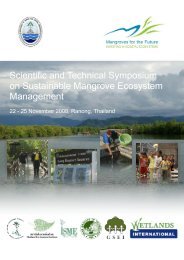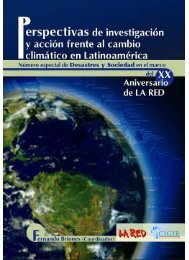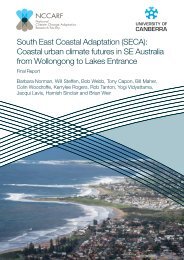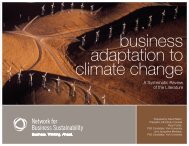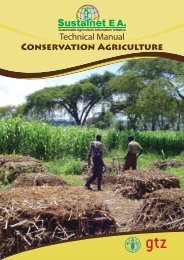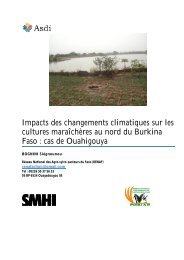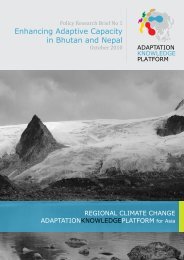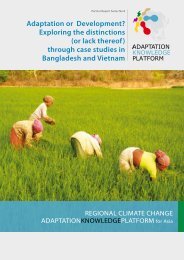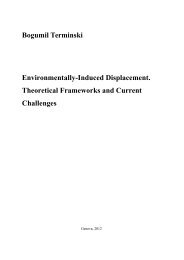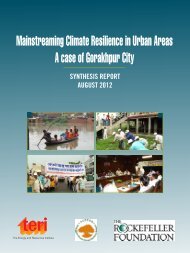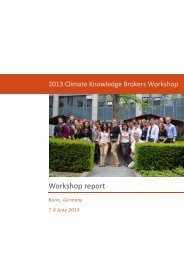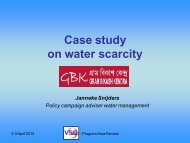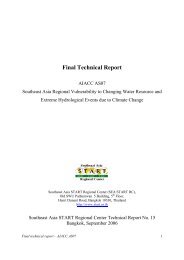of the Verde Island Passage, Philippines - weADAPT
of the Verde Island Passage, Philippines - weADAPT
of the Verde Island Passage, Philippines - weADAPT
Create successful ePaper yourself
Turn your PDF publications into a flip-book with our unique Google optimized e-Paper software.
climate change vulnerability assessment <strong>of</strong> <strong>the</strong> verde island passage, philippines<br />
Tourism sector<br />
Policy and implementation mechanisms were identified,<br />
all <strong>of</strong> which could address climate change impacts but<br />
will bring in o<strong>the</strong>r benefits in pursuit <strong>of</strong> environmental<br />
management, such as <strong>the</strong> following:<br />
• Strictly implement existing laws at both <strong>the</strong> national<br />
and municipal levels.<br />
• Develop sustainable financing mechanisms, such as<br />
implementing user fees in o<strong>the</strong>r areas and covering<br />
recreational activities o<strong>the</strong>r than scuba diving.<br />
• Streng<strong>the</strong>n existing organizations and management<br />
bodies.<br />
• Increase technical expertise on survey and<br />
monitoring <strong>of</strong> underwater resources at <strong>the</strong> local<br />
level.<br />
Recommendations that directly deal with climate<br />
change impacts were also provided by inter-agency<br />
workshop participants:<br />
• Include CC adaptation strategies in all AIPs.<br />
• Convene all major stakeholders <strong>of</strong> <strong>the</strong> tourism<br />
industry to formulate an adaptation plan in dealing<br />
with CC, to include resort owners, boat operators,<br />
and tourism-related associations.<br />
• Provide incentives for community/PO to get <strong>the</strong>ir<br />
involvement and commitment.<br />
• Develop reader-friendly information materials and<br />
multimedia IEC materials on climate change.<br />
Foreshore development<br />
Many <strong>of</strong> <strong>the</strong> management recommendations for<br />
foreshore area management deal with institutional<br />
changes within <strong>the</strong> current government set-up<br />
as well as completion <strong>of</strong> baseline and monitoring<br />
records. National government agencies are being<br />
asked to issue policies that will mandate LGUs to<br />
manage <strong>the</strong>ir respective foreshore areas. LGUs are<br />
recommending that foreshore area management be<br />
devolved to <strong>the</strong>m, so that <strong>the</strong>y can appropriately issue<br />
a moratorium on Foreshore Lease Agreements (FLA).<br />
Should management remain within <strong>the</strong> DENR, LGUs<br />
recommend stricter monitoring, shortening <strong>of</strong> FLA<br />
periods, and revocation <strong>of</strong> agreements for those that do<br />
not comply with <strong>the</strong> FLA conditions.<br />
Following is a list <strong>of</strong> management recommendations<br />
being made for national government agencies.<br />
Recommendations specific to addressing climate<br />
change include <strong>the</strong> following:<br />
• Implement adaptive building design to address<br />
accelerated sea level rise and storm surges.<br />
• Allocate budget for addressing climate change<br />
impacts.<br />
• Institutionalize Task Force on Climate Change at all<br />
levels <strong>of</strong> government.<br />
Within <strong>the</strong> mandate <strong>of</strong> LGUs, a number <strong>of</strong><br />
recommendations emerged that may address climate<br />
change impacts but can result in o<strong>the</strong>r benefits as well:<br />
• All LGUs should create and designate MENRO.<br />
• Implement mangrove reforestation.<br />
• Translate policies, plans, etc. for action by barangay<br />
chairpersons.<br />
• Strictly enforce <strong>the</strong> building code.<br />
• Streng<strong>the</strong>n LGU-NGO partnerships.<br />
• Include upland stakeholders in CRM planning and<br />
activities.<br />
Specific to management <strong>of</strong> foreshore areas are as<br />
follows:<br />
• Devolve FLA approval to LGUs, so <strong>the</strong> latter can<br />
issue moratorium on FLAs.<br />
• DILG to mandate LGUs to manage foreshore areas.<br />
• DENR should monitor FLAs.<br />
• Revoke agreements between leases and<br />
government for non-compliance <strong>of</strong> terms.<br />
• Shorten FLA term for foreshore areas that are titled.<br />
• Encourage owners to undertake mangrove<br />
reforestation.<br />
• Revoke titles <strong>of</strong> abandoned foreshore areas.<br />
• Amend existing policies, resolutions, etc. to specify<br />
rules on foreshore areas.<br />
In order to address foreshore area management<br />
more effectively, participants recommend undertaking<br />
research in <strong>the</strong> following areas:<br />
• Complete physical inventory and socio-economic<br />
pr<strong>of</strong>ile <strong>of</strong> foreshore areas.<br />
• More research on coastal erosion.<br />
• Complete inventory <strong>of</strong> environment-related policies.<br />
Health and food safety<br />
People’s health an be compromised by abrupt changes<br />
in atmospheric temperature, accelerated sea level<br />
rise and saltwater intrusion into groundwater sources.<br />
Immediate negative impacts can occur to livelihood<br />
and income, food security, health, education, human<br />
settlement and housing.<br />
• Have health and safety in <strong>the</strong> climate change<br />
adaptation framework and strategy <strong>of</strong> <strong>the</strong> lead<br />
mandated agency (DOH, LGU).<br />
76


